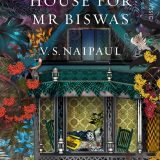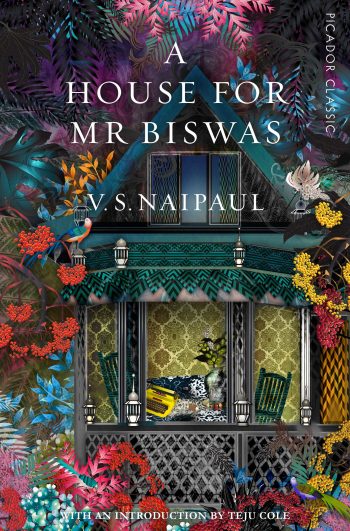A House for Mr. Biswas – V.S. Naipaul – 1961
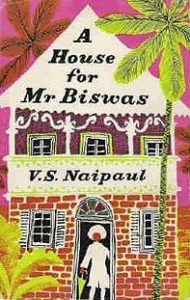
The following is a compilation of discussions and reviews from the previous version of our website. We hope you enjoy these older deliberations. Just beware, there may be spoilers in here. To add your own review or remarks, please scroll down to the comment box. — ReadLit Team
Chris on 27/4/2002, 0:37:43
I am not disappointed. I had high hopes for our April book as I had previously read several books by V.S. Naipaul and enjoyed them all. I am happy to say that not only did I thoroughly love Mr. Biswas, but to-date it is my favourite of the books we’ve read together.
Before I begin with my general comments there are a few questions that I’d like to pose to all of you.
-What did you think of Mr. Biswas’ and Shama’s relationship? Did they love each other?
-Do you think Mr. Biswas’ aversion to the oppressive communality of the Tulsi household was a result of his own lack of family structure?
-Why do you think he bonded with Savi and Anand but not with his other children?
I will post my own thoughts about these and other things in a few days (I’ll be out of town for the weekend), but in the meantime I’m curious to hear what your respective opinions are.
By the way – did anyone catch the joke about Hanuman House and the wooden bridge to the back house, which was referred to as “Ceylon”? Naturally, the house was so named for the statues of Hanuman outside of the store. Hanuman was, depending which story you’re reading, alternatively the Monkey God or the Monkey King of Hindu myth. In one of these myths Hanuman builds a wooden bridge to the island of Ceylon, hence the name of the small house across the bridge.
Very clever.
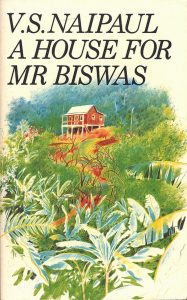
Dave on 27/4/2002, 5:30:31
Off the top, I concur with you Chris that AHfMB is also my favoUrite of our books we’ve read together thus far. I loved Naipaul’s style, imagery, and character dialogue. For me, dialogue has to be authentic, I hate when characters talk with each other as though… they were characters in a book. Even when Shama said something as simple as her repetitive “Man”… I sensed everything as being very authentic, and un-retouched. Loved the Trinidadian banter. I noticed a similar dialogue skill in Richler’s “Duddy Kravitz”.
As I read the book, I made note of adjectives I would use to describe Mr. Biswas. My list looked like: ungrateful, arrogant, stubborn, cowardly, weak, malicious, unresourceful, fickle, gullible, fearful.
And yet, and YET… my overall impression was that I sympathized with his troubles, felt bad for him, took his side in many arguments… Naipaul kept me wishing that this guy’s ship would come in. Somehow, Biswas is loveable.
You asked some great questions. Did Biswas and Shama love each other? Wow, this was something I kept wondering throughout the book and I still am not sure. I mean, is there even one reference to any normal conjugal relations other than the fact that they produced children somewhere between the lines? If we allow that there was real “love” we must at least admit that their was literally NO ROMANCE. And what can we expect from a relationship that is forced by others into radical commitment and founded on the immature scribblings of a note? If anything, I feel that Shama “loved” Biswas more than Biswas “loved” Shama. She managed this feat because she understood forgiveness… Biswas did not.
Their marriage suffers greatly because Biswas is unable to live in the present. For Biswas “real life was to begin for them soon, and elsewhere. The Chase was a pause, a preparation” (p.147). He seems forever unable to embrace the significance of any given moment. But for Shama “life” means to fully experience every stage, every function. “Life, to be full, had to be this established pattern of sensation” (p.160). She embraces the moment! This disparity ruins them more than anything.
Your next question ties right in to the first one, because Biswas’ inability to truly love Shama stems from his ungrateful attitude toward her whole family. Because he loathes the Tulsis he cannot appreciate her connection to them. Hence, the shameful lack of respect and verbal abuse towards Shama.
Biswas’ own upbringing has a lot to do with his aversion to the Tulsi kingdom (or should we say “queendom”?) but the real bigger issue is this: Very early on in his marriage we see that Biswas does not want to relinquish his sense of freedom, even though FREEDOM does not serve him well at all. He is the sort of character who hates responsibility, lacks resolve and conviction, and needs constant supervision and instruction… yet, he cannot accept the needed instruction. The Tulsis represent order, success, and the ready ability to instruct! That all of this is presided over by a tyrannical matriarch and some adopted henchman/goon (Seth) is intolerable to Biswas. To Mr. Biswas, the Tulsis are like a “cult” and he has no intention of joining. So, being married to one of the cult-members only aggravates Biswas further.
Your third question, about Savi and Anand is a very good one. Why did he bond with them more than with his other children? Could it be that they represented for him a time prior to his breakdown in Green Vale? (The despair of Green Vale had given him an experience of unhappiness against which everything had now to be measured. p.304). Against this, an even more interesting question is why did he, at one point (p.273-274) want to KILL Anand and Savi rather than Shama and/or Myna?
This is a truly superb book, and for now I will refrain from saying more than the above comments. O.K., one more thing… I thought it was sad that it took nearly an entire lifetime before Mr. Biswas was able to leisurely enjoy, or even REALIZE, the sheer beauty of Trinidad (the trip to the beach p.504). Here, the whole family realizes that there is a lot more to life than what they have known of it.
Ah, Mr. Biswas, we all want you to be finally at peace… relaxing somewhere… fiddling with your hammocky calves…
Lale on 27/4/2002, 22:48:07
Me too. Loved it. 5 hearts. Great book.
Throughout the book I was obsessed with the possibility that Biswas was Naipaul’s father and Anand was Naipaul himself. After I finished the book, I went back to the beginning and read the introduction by Ian Buruma whom we had already heard of, thanks to Guillermo Maynez (“Anglomania: a European love affair”, by Dutch author Ian Buruma). I, habitually, read the introduction after finishing the book because most of the time they reveal way too much about the book. Anyway. In the introduction Ian Buruma confirms what I had suspected all along. Mr. Biswas was based on Naipaul’s own father, a journalist.
I also suspect that Naipaul himself is not limited to Anand, parts of him are in Mr. Biswas too.
: By the way – did anyone catch the joke about
: Hanuman House and the wooden bridge to the
: back house, which was referred to as “Ceylon”?
: Naturally, the house was so named for the
: statues of Hanuman outside of the store.
: Hanuman was, depending which story you’re
: reading, alternatively the Monkey God or the
: Monkey King of Hindu myth. In one of these
: myths Hanuman builds a wooden bridge to the
: island of Ceylon, hence the name of the small house
: across the bridge. Very clever.
So that’s where the “monkey house” comes from! Very clever indeed. Multiple references.
-What did you think of Mr. Biswas’ and Shama’s relationship? Did they love each other?
I agree with Dave. I think they did care for one another but there was no romance whatsoever. They loved one another but they were not “in love”. They also lacked tenderness. They were concerned, in general, with each other’s well being, but not necessarily each other’s more subtler needs. I don’t know if this was because they did not notice the subtler desires and needs, or if they didn’t want to or know how to address them.
-Do you think Mr. Biswas’ aversion to the oppressive communality of the Tulsi household was a result of his own lack of family structure?
This is a touchy topic for me. I associated with Mr. Biswas in a way most people can’t. The disconnect Biswas felt towards his mother and brothers was very similar to my own inability to relate to my family. I do understand or envy other people’s loving connections for the members of their families, but, just like Biswas, I cannot understand or tolerate any kind of sibling/parent love that defies logic and reason. In the book there were many instances when Shama or other sisters should have sided with Biswas instead of blindly and invariably siding with their blood relations. But they didn’t. They chose “the family” consistently and unreservedly. This was what Mr. Biswas could not stand, accept, allow. Maybe, had he come from a similarly bound family, he might have been able to tolerate some of Shama’s needs to please her mother or her sisters.
There were many despicable characters in the Tulsi household. Chinta, for instance, was such an unpleasant character even though she also had to be pitied for being beaten by her husband. Govind of course was the worst of them all.
I found the dialogs hilarious and the style captivating. Someone or something is called by a name once and then it sticks, like “readers and learners”. For instance “W.C. Tuttle” was the author of the books the brother-in-law was reading and then it became his name henceforth. Or when describing Owad’s first days after his return: “Scathing was one of his favourite words” and later “This was clearly one of Owad’s scathing comments.”
I loved this book. In every way. The dialogs are wonderful:
“Vidiadhar and Shivadhar! You just keep your little tails here, eh, and read your books, you hear. Your father is not in any position to take you for excursion, you hear. He not drawing money regular from the government, let me tell you.”
After flogging a kid:
“That should satisfy some people.”
Every time Biswas was cheated (buying a flawed house for twice its worth) I remembered one of my own lousy bargains.
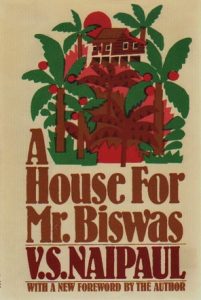
Lale on 29/4/2002, 9:27:34
This will be a very very easy quiz, do you know who this French writer is?
“Once Mr. Biswas had read a story by a French writer about a woman who worked for twenty years to pay off a debt on an imitation necklace.”
This was the very first story of this author that I had read when I was a little kid. Probably you all read it when you were very young too, it is a very famous story.
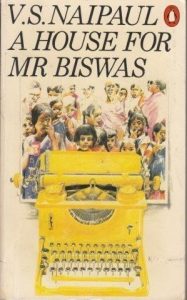
Tony on 30/4/2002, 0:12:56
I thoroughly enjoyed the book. I loved hearing the argot, particularly of Indians from T & T again even on the pages.
People who get into arranged marriages of the short between Biswas and Shama are not expected to be in love and do not fall in love. The relationship of marriage has only recently in some parts of the world been petrified with the idea that there is some freedom and romantic love associated with it. In large parts of the world this is still not the case. For many of us where it is supposed to be the case, really the factors that enter the picture are money, money, money, and social standing.

Lale on 30/4/2002, 10:24:29
: I loved hearing the argot
Yes, it was one of the biggest charms of the book.
(btw, argot: 1860, French origin, of unknown etymology) jargon, slang, peculiar phraseology of a class, originally that of thieves and rogues. Oxford dictionary)
: For many of us where it is supposed to be the
: case, really the factors that enter the picture
: are money, money, money, and social standing.
Biswas and Shama’s marriage was a little different than your typical “arranged” marriage. First there was a childish and temporary attraction of Biswas to Shama. Regardless of the shakiness of this initial attraction, it was what triggered the marriage, so can’t be ignored. Secondly, there should be two parties that arrange the marriage. Here, it was arranged single-handedly by the Tulsis.
A boy of 16-17, without a father figure or a proper family guidance cannot be expected to make the right decision on a life-and-death matter. I truly felt that he was trapped. Of course, like Dave said earlier, he was weak and didn’t object. He let it happen.
Also, Biswas’ sister, I think her name was Duhiti, she ran away with the gardener boy. People of this community, just like the people all around the world, are not invincible against physical, chemical, mental, intellectual attraction.
The more I think about the book, the more I am impressed with Naipaul’s talent to write 580 pages, every single one of them gripping, on a story that starts with the death of its hero. And the hero, was by no means a likeable character, mind you. Dave listed out his flaws.
: ungrateful, arrogant, stubborn, cowardly, weak, malicious,
: unresourceful, fickle, gullible, fearful. And yet, and YET… my overall impression
: was that I sympathized with his troubles,
: felt bad for him, took his side in many arguments…
: Naipaul kept me wishing that this
: guy’s ship would come in. Somehow, Biswas is loveable.
I did not find Biswas loveable, but I did sympathize with his troubles, and I did take his side in most of the arguments. I rooted for him. The point is, even though Biswas was not that great of a personality, and he was even not beyond kicking his wife, page after page we were grappled by his story. That is Naipaul’s tremendous talent.
I could not forgive Shama on a few occasions. She may have had her reasons, but letting Seth name her kids was unacceptable. Also her reaction to Savi’s doll house and her ultimately destroying of it were signs of weakness for a woman otherwise strong and determined. She gave in. At the cost of her daughter’s happiness.
On the question of why Biswas could not/did not connect with his two younger children as he did with Savi and Anand: I think he eventually did connect with them. Remember initially it was only Savi. Then he “claimed” Anand. I think Biswas waits until his children get out of the kitten stage and go into the person stage before he can be friends with them. But, in any case, Anand was special. Maybe because he was a boy. Maybe because he was the one who stayed with him when he had his breakdown. Maybe because Anand, by birth, was an intellectual (like Biswas himself). And at the end it was Anand who did not come to his aid, and did not come to his funeral.
I read in the introduction by Ian Buruma, that in all of his books Naipaul writes about his father. He might be so obsessed with telling his father’s story because he did not see him before he died and did not return his letters and did not go to his funeral. As people age, these things bother people. Writing, again and again, his father’s story might be showing us Naipaul’s regret.
Lale on 30/4/2002, 12:42:43
TUTTLE, W(ilbur) C(oleman) (1883-1969)
Sheepherder, cowpuncher, salesman, railroader, ranger, baseball player, cartoonist, and, of course, a prolific writer of westerns, often with a humorous slant. These stories made him one of Adventure’s more popular writers. Born in Glendive, Montana Territory; probably died in California.
In case you want to read them here are a few samples 😉 Remember Mr. Biswas called them “trash.”
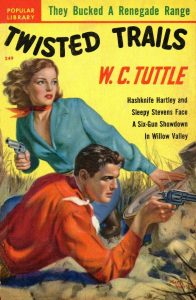
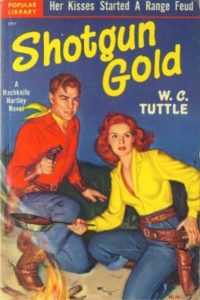

The Sherlock of Sageland: The Complete Tales of Sheriff Henry, Volume 1
Anna van Gelderen on 30/4/2002, 13:25:21
As I mentioned earlier I loved this book. I also became fond of Mr Biswas. I know he is weak, often insufferable and exasperating, and doesn’t appreciate his wife enough (to mention just a few things), but he is also so very very human. Growing up without a father from an early age, with a mother who couldn’t cope, nobody there to give him proper guidance, no special talents, he is swooped up by the Tulsis. The Tulsis are almost a force of nature, against whom resistance seems futile, but Mr Biswas nevertheless rebels. I know his rebellion is mostly feeble and ineffectual, but at least he tries desperately to keep his individuality and I liked him for that. The Tulsis would have driven me bonkers, too, if I would have had to live with them. Dave, you said they respresented order and success. But to me they stand for chaos and impermanence. Just look at their houses: they are like jungles, with everything being makeshift and in decay and in disarray, people flopping down everywhere. And when the Tulsis acquire a lovely country estate they ruin it and let it go to seed. No wonder Mr Biswas longs for nothing so much as his own house.
I also loved the quiet humour: the way Mr Biswas is invariably called Mr Biswas by the author even when he is a baby, the way in which his brother-in-law is called W.C. Tuttle, just because he has some books by this author, the way Anand’s examination is described, with all those highly strung fathers, the term “deserving destitutes”. In the midst of a sad and serious scene, the funeral rites for Mr Biswas’s father, bossy Tara suddenly steps in and shouts “Photo now. Quick.” It is so funny and it also illustrates the tone of the book: nobody has a lot of time for being sorry for themselves or others – life goes on. No time for being sentimental, just be practical. Everybody seems obsessed with material wealth and status, but that is understandable when you are just one step away from poverty and starvation.
Marvellous book. Five hearts for me, too.

Chris on 30/4/2002, 21:01:59
To me, Mr. Biswas was the ultimate loveable looser. He was weak, irritable, and would have been an infuriating person to know. He seemed utterly unable to make decisions and yet resented anyone who would put themselves in a position to shape the course of his life. I have met people who share Mr. Biswas’ most aggravating characteristic – all talk and no do. He fits into the classic category of people who talk big and pretend to have big goals (“gonna buy you that gold broach girl!”) but who lack the resolve to get off their butt and do it. My favorite part of the book had to be watching Mr. Biswas slowly realize his own weaknesses and his own lack of resolve. In true form, he eventually begins to make light of his deficiencies and even speaks playfully about them to Shama (his last use of the “gold broach” statement is clear self-deprecating).
I was fascinated by his relationship with Shama. I think she was the stronger personality, and if she had the power to control their situations (she obviously didn’t because of the almost slavish grip of her family obligations) they would have been better off. I found myself wishing the more of the book had been devoted to exploring Shama’s character. I wondered what made her tick, why exactly did she always bow to the demands of her family (the Tulsi’s) even at the expense of her own immediate family. I especially wondered how she felt about Mr. Biswas. Their relationship was often combative, and certainly wasn’t ‘loving’ in any normal sense. I think they were more dependent upon each other than in love; almost in a fatalistic sense. Still, I think they did love each other in a way. I really didn’t think so until the end, when Shama, still playing the martyr, decided to go live with Mr. Biswas in his house; a move she needn’t have made and which roused the ire of the Tulsi’s. To me this decision of hers was more than a sense of duty, it was evidence that she appreciated Mr. Biswas efforts to provide for her, despite all of his proclamations that he was only working for himself.
Mr. Biswas’ relationship with his children was curious. It seemed that he related more with Anand than with the other children because they had similar personalities. Kamla and Myna, I think, he never really considered his children. From their births they were simply part of the Tulsi hoard, no more a part of him than the readers and learners. I was disappointed in Mr. B for giving up on Savi. Initially he seemed to want much for Savi, but somewhere along the way lost interest in her, and began to treat her as another incarnation of Shama – someone nominally on his side, but someone who he couldn’t necessarily count on.
I have noted previously, and I’ll reiterate, that this has been my favorite book so far. The story, characters, and style are truly beautifully drawn, and I find it vastly superior to other Naipaul books I’ve read (“In a Free State” and “A Bend in the River”)
Five hearts.

Tony Thomas on 30/4/2002, 22:03:43
: Biswas and Shama’s marriage was a little different than your typical
: “arranged” marriage. First there was a childish and temporary attraction
: of Biswas to Shama. Regardless of the shakiness of this initial attraction, it
: was what triggered the marriage, so can’t be ignored.
Yes exactly, although there a simple flirtatious attraction by Mr. B that the Tulsi immediately turned into marriage. You see their frenzy to marry their daughters to anyone who is a Brahmin bore on the right signs, which is part of the culture. I have had friends who are otherwise rational reputable scientists of international repute from the subcontinent who will not get into a serious relationship, let alone marriage, based on conflicting horoscopes. This in the 1990s in Miami, not the 30s in southern Trinidad!!!
: Secondly, there should be two parties that arrange the marriage. Here, it
: was arranged single-handedly by the Tulsis. A boy of 16-17, without a
: father figure or a proper family guidance cannot be expected to make the right
: decision on a life-and-death matter.
Well of course, and this is the real inner core of this novel, the driver of all conflict. Mr. Biswas is person without family, not just in the personal sense, but in the bigger sense in that he is alienated from the his family and seeks to live in a broader world based on literary life and rational world, but he cannot escape the idiotic social life and ends up at war or alienated with both wings of his family.
I would seriously doubt that had his father lived, or were he a member of the Tulsi’s that in the universe of this novel a “proper” marriage would have been made. Mr. Biswas is a person who is revolted by the small life of the money grubbing commercial and agricultural petit bourgeoisie represented by his maternal aunt and uncle and by the Tulsis. Someone else would have strived to be a successful person in that world, as he remarks perhaps his brothers have become working on estates in the South. It is Mr. Biswas’s alienation from this and his desire to lvie with is books that empowers him, or at least provides the energia. A proper arranged marriage by Hindus is often done when the people are children, rarely done if the people have actually met before the arrangement, and often is mediated by caste, family alliances, and astrology.
: I truly felt that he was trapped. Of
: course, like Dave said earlier, he was weak
: and didn’t object. He let it happen.
Under the circumstances he received a golden opportunity as it would have appeared to anyone else in his station. He had the opportunity to marry, to improve his place,and escape the confines of his own family. A man in his condition without family and money and without a social world to live in would have NO opportunity to marry, unless, he escaped the whole world.
: Also, Biswas’ sister, I think her name was
: Duhiti, she ran away with the gardener boy.
Yes. of course had he done that there would have been no novel. For the novel to exist, he has to have some weaknesses that will get him close enough to the situation so it can be critique and ridiculed and understand. If he had found someone else we have no novel. Likewise part of his personality is that he retains some pretenses as a Brahmin, as a potential middle class person in order to have this struggle. Unlike his sister’s gardner husband, Mr. Biswas refused to become an attendant at the mental health hospital etc. So he is set up for the war that is this novel.
: People of this community, just like the people all around the world, are not
: invincible against physical, chemical, mental, intellectual attraction.
Yes, and I can tell you of more people out of his community and his contemporaries who made much bigger leaps than marrying out of cast, leaps onto the stage of world revolution!!
I agree wholeheartedly about the mastery, I felt sorry there weren’t another 200000 pages to continue reading. I felt bad it was over, but I thank you all for opening my eyes to Naipaul who had dismissed after hearing him read a couple decades ago.
I completely loved Mr. Biswas and don’t agree with any of these negative comments about him–his flaws are mine is probably the reason behind it. I don’t think some of us understand Shama because for her the family is the Tulsis not her linkage with Mr. Biswas which should be subordinated to the Tulsi’s. For her her daughter’s happiness is her integration into the Tulsi clan, not anything that would pull her apart out into some other clan. For her Seth is in change, of course, only until he crosses the Tulsis himself. You can’t judge these people outside the social and religious and psychic world they live in, which is not the same as of urban intellectuals in advanced countries in the 21st century!!!!
What Naipaul does so well is he presents a satire of this without making them villains or totally unrealistic.
I have a text that has no such introduction. My observations that many great writers are trying to write about one theme throughout their work. My experience is that non-writers understanding that a writer may use his past or a relationship as material in his work, to neglect the fact that a writer if he is any good is filling that material with the products of his own imagination and thinking, not repetition of history.

Lale on 2/5/2002, 12:14:23
: This will be a very very easy quiz, do you know who this French writer is?
: “Once Mr. Biswas had read a story by a French writer about a woman who worked for
: twenty years to pay off a debt on an imitation necklace.”
Guy de Maupassant. He wrote many stories about women and jewellery. This particular one goes like this (from memory):
Two friends. One has a lot of jewellery. The other, who is not rich at all, one day gets invited to a big party. She is able to buy a nice dress but has no accessories to go with it. She asks her friend if she can barrow one of hers. The rich friend gladly opens all her jewellery boxes before her and tells her to choose whichever she wants. The poor lady’s eyes immediately catch a beautiful brooch. The rich friend tells her that that particular one is not all that great and tries to get her interested in other pieces of jewellery. But the poor lady is hung up on that brooch and doesn’t want anything else. So she ends up borrowing that one, for one night.
The modest couple go to the party. The woman looks lovely in her new dress and with the borrowed brooch. She dances a lot and has a great time (she spurns her husband but that’s another story). After the party, on their way back home, they realize that the brooch is no longer attached to the collar of her dress. It is gone. They search everywhere, they can’t find it.
The next day, the husband and wife go to a jewellery store and find an almost identical brooch. It is very very expensive. They buy it, undertaking tremendous debt. They return the newly purchased brooch back to the rich friend. She suspects nothing.
Years go by. The two friends’ roads separate. The poor one is very busy working day and night to pay the debt. The two friends don’t see one another for many years, probably because one of them now has no time to socialize, working multiple jobs.
One day they meet. The rich friend is dismayed at the appearance of her friend. She is beat, tired, worn out, aged prematurely. She says “what happened to you?” The poor friend then tells the story of the lost brooch and how they replaced it and how they have been working hard ever since to pay off the debt. The rich friend says “but my dear, that was fake!”
From Mr. Biswas:
“He had never been able to undrestand why it was considered a comic story. Debt was a fearful thing; and with all its ifs and might-have-beens the story came too near the truth: hope followed by blight, the passing of years, the passing of life itself, and then the revelation of waste: Oh, my poor Matilda! But they were false!”
(I highly recommend one of Guy de Maupassant’s short story collections, try to pick one that includes “Boule de Suif”, this title is usually left untranslated, it roughly means a ball of fat, suif=suet, tallow, fat of mutton/beef).
Lale on 2/5/2002, 12:18:25
A little proofreading error on page 142:
The window itself, ill-fitting lengths of unmatched wood held together by two cross-bars split by massive nails that had been hammered back flat and grown rusty, the window itself was rectangular and was unable to fill the rhomboid vacancy.”
One “window itself” too many, wouldn’t you agree?
Dave on 3/5/2002, 3:50:40
I agree that there is something wrong there…. the sentence itself is a trifle rhomboid! (having unequal adjacent sides).
I think it’s neat how you picked up on that Maupassant allusion Lale.
This is just a note way off in the middle of nowhere… but I wanted to throw a question out there to the readers. Often I was confused as to WHEN this story took place. At one point there is a hint that it is taking place somewhere around 1919. But then later (p.410) there is talk of an “old” Ford car of the 1930’s! So, I was confused a bit. Anyone have a theory on when Biswas is set?
Overall during the story, I did not like Mrs. Tulsi or Seth very much at all. But one thing “the old hen” said one time really made me think. Remember when Mr. Biswas was trying to demonstrate genuine repentance over something (I forget the issue), and she kept saying… “can someone be sorry for something he THINKS?” and again… “for something he FEELS?” It made me realize that I too, sometimes say “I’m sorry” when really I am not sorry at all. I’m just trying to placate someone else’s disappointment or anger.
A House For Mr. Biswas is definitely a 5-heart book in my opinion.
Lale on 3/5/2002, 12:15:20
: Often I was confused as to WHEN this story took place.
When Anand is a boy (10-12), the second world war is taking place.
I place the death of Mr. Biswas somewhere between 1955 and 1960. He died at the age of 46. So he must have been born somewhere between 1910 and 1915.
: But one thing “the old hen” said one time really made me think. Remember
: when Mr. Biswas was trying to demonstrate genuine
: repentance over something (I forget the issue), and she kept saying…
: “can someone be sorry for something he THINKS?” and again… “for something he FEELS?”
If it’s truly evil, you can be sorry for even thinking/feeling something. Of course in Mr. Biswas’ case it was some simple resentment of Seth or one of the gods, so Mrs. Tulsi’s “how can you be sorry for something you think?” was apt.
A review from David Lentz on 4/5/2002, 10:54:41
David B. Lentz
Having read several of the novels of V.S. Naipaul, A House for Mr. Biswas is clearly his greatest masterpiece. I have learned over the course of time that one of the signs of great literature is the unobtrusiveness of the master within the masterpiece. That is to say, the writing is elegant but simple, even humble, straightforward and handsomely crafted. It is devoid of unintended efforts by the author to impress readers with literary gadgetry or obvious devices. For example, it’s virtually impossible to read the works of James Joyce or Proust without an acute awareness of the omniscience of the author in the work. However, in A House for Mr. Biswas, one becomes transported by the writing and lost in the imagery, a literary luxury that a more intrusive author does not afford. Mr. Biswas is a simple Indian man living In Trinidad who seeks merely to own a modest home. But every effort to do so is met by fate and fortune and the ill-will of family or nature to lead inevitably to his failure. His efforts are noble and genuine but doomed to futility at every turn. The misfortunes of Mr. Biswas and the futility of labor remind one of the words of Tenneyson who lamented, “Why should life all labor be?” But in midlife and later in life what one regrets most is that so much time was invested in the futility of hard labor. Life races by, accelerating as we grow older, with little enduring results despite vast, unrecoverable tracts of time lost in the pursuit of objectives deemed worthy to justify its sacrificial passage. The humble ambitions of Mr. Biswas toward this one simple, common, human endeavor are both comic and tragic concurrently. The existentialists would have a field day with Mr. Biswas as a contemporary Everyman coming to grips with the yawning maw of the futility of life and its fundamental absurdity — one’s dreams and ambitions are so rarely in sync with one’s abilities to achieve them. In this respect the futility of Mr. Biswas to find even the most humble home of his own renders him intensely human and endearing. It is easy to identify with him and laugh at him and understand that one has so much in common with him. But Mr. Biswas is tireless and resolute in his energetic, enthusiasm for his monomania. He cannot be defeated because he never gives up and despite the imperfections of his quixotic quest, he is all too human because of it. Naipaul as a young man grew up in the Carribean, studied on a scholarship at Oxford, lived in the English countryside and in the bush of Africa. I’m not sure that he ever really felt settled or comfortable wherever he lived: he seemed to feel alienated and at odds with an inhospitable universe. The novel is a great study of the eternal verities of human nature. Mr. Biswas is an enduring and uniquely drawn character by an author whose talent is so great that his presence is almost imperceptible in the masterwork. Like an invisible divinity, he simply crafts a world and leaves it to us to make sense of it. Just as we must make sense of our own everyday existences and understand that our shortcomings and failures are the shadows that give definition to the enlightenment that we bring to our own lives in the meaning we find therein. The Nobel Prize judges rightly honored the immense, humble talent of V.S. Naipaul, who has shed new light on the human condition and done a great service to humanity in the sure hands of his art.

Posted by Guillermo Maynez on 12/6/2002, 17:38:31
I going to tell you my comments on Mr. Biswas book. I not living with a lousy family like the Tulsis. I working much these days but I finally finished this long and great book.
I have read all your comments posted here and basically I agree that this is a very good book.
Like some of you, I don’t really like Mr. Biswas: besides all of the defects stated by Dave, I found Mr. Biswas very violent towards his children–remember the time when he throws a glass to Anand, breaking his eyebrow?
But certainly I could identify with his many predicaments: I have also felt at times that all the effort is futile, that somebody has cheated on me by selling me something useless for a big amount of money.
Although it certainly has a good subtle and intelligent sense of humour, which I appreciated, I find it hard to say this is a “pleasant” book, and for good reasons. Most of the character’s lives are sordid, miserable and even horrible. But then, that is what life was at that place in taht time, and it still is for most people of the world. Lucky us, for all the pain we may have suffered in our lives. I mean, take a look at our June book, “A very long engagement”, and thank God that us males didn’t have to go to war and you females didn’t have to lose your sons to a stupid and truly useless war.
But, back to Biswas: I agree with those who say that part of the mastery of the author is shown in the fact that he never appears: he just creates a world and let it run, with virtues and shortcomings, just like the one who made this world. In this he reminded me of Vargas Llosa in TWotEotW: he creates the world of Canudos and never meddles in.
Well, I am aware I’m too late for this discussion, but I didn’t want to miss the chance to say that this was a good book, that I enjoyed the little world created by Naipaul, and that though I grasped Mr. Biswas’ shortcomings, I could identify with his predicaments.


